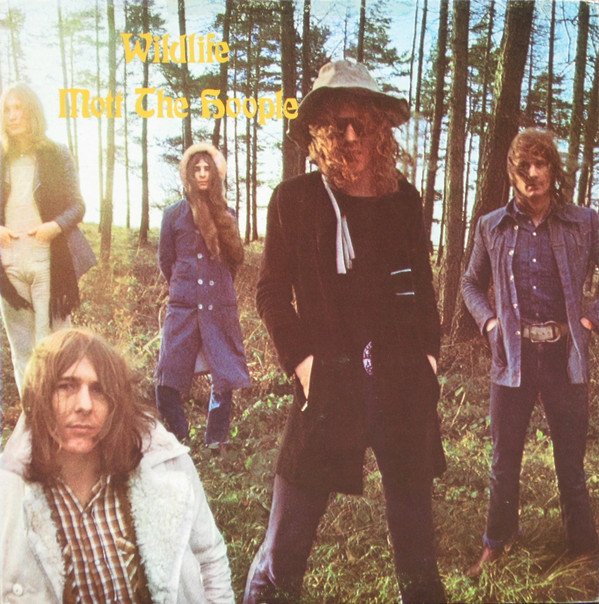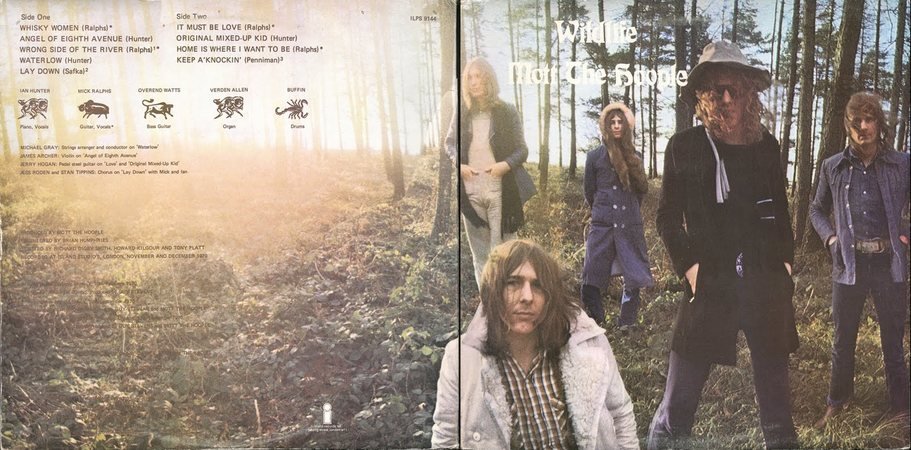MOTT THE HOOPLE - WILDLIFE: The Country-Rock Chill-Out Of The Island Years
All of the Mott The Hoople albums from their Island Records era have their partisans but if one had to be singled out as the least popular of the group, it would easily be Wildlife.Despite some classic songs and performances, it's the most atypical of the bunch for more than one reason. For starters, Guy Stevens, the svengali/producer of the band's first era had no involvement in this long player: he'd worn out the group with the tormented genesis of Mad Shadows and had his own personal demons to battle. It's also a patchwork affair, mixing new sessions with a few outtakes and a live track.Most damningly to Mott's rocker fanbase, it is much more low-key than the albums that came before or after: despite barnstorming opening and closing tracks, much of the album is given to the lighter side of country rock and moody balladry, with Mick Ralphs dominating the proceedings more than Ian Hunter. Thus, Wildlife is advanced listening, one for the devoted fans, but it should not be dismissed as an aberration or misfire. It's simply a multifaceted band presenting a different face to its listeners. If you can step away from Mott-as-untamed-rockers dogma often applied to their early days by rock fans, it offers its own subtle rewards.Like prior Mott albums, Wildlife divides itself between the mindsets of its two songwriters. Mick Ralphs has the upper hand here and he goes for a solid, journeyman take on the country-tinged, rootsy rock popular at the dawn of the '70s. "It Must Be Love" and "Home Is Where I Want To Be" boast singalong refrains and favor acoustic over electric guitars, with the former throwing in a bit of pedal steel, while "Wrong Side Of The River" is a ballad that finds Ralphs venturing into Hunter-esque territory (albeit sans the personal lyrics) and doing nicely atmospheric work.Hunter has just three songs this time out but each is a stunner in its own gentle way. "Angel Of Eighth Avenue" has a Dylanesque evocation of New York but does so in a dreamily hypnotic slow-burn style while "The Original Mixed-Up Kid" is an autobiographical piece that offers a softer version of the self-mythologizing he often did in his Mott material.That said, his best track here is the lightly orchestrated "Waterlow," a heartbreaking exploration of his feelings over the divorce-induced separation from his young children. If Mad Shadows saw him working through the pain of the divorce, this song finds him artfully exploring the sorrow that followed. His frail high-tenor delivery of the lyrics makes the mood devastating - and the song is a Hunter favorite that he continues to perform live today.
Thus, Wildlife is advanced listening, one for the devoted fans, but it should not be dismissed as an aberration or misfire. It's simply a multifaceted band presenting a different face to its listeners. If you can step away from Mott-as-untamed-rockers dogma often applied to their early days by rock fans, it offers its own subtle rewards.Like prior Mott albums, Wildlife divides itself between the mindsets of its two songwriters. Mick Ralphs has the upper hand here and he goes for a solid, journeyman take on the country-tinged, rootsy rock popular at the dawn of the '70s. "It Must Be Love" and "Home Is Where I Want To Be" boast singalong refrains and favor acoustic over electric guitars, with the former throwing in a bit of pedal steel, while "Wrong Side Of The River" is a ballad that finds Ralphs venturing into Hunter-esque territory (albeit sans the personal lyrics) and doing nicely atmospheric work.Hunter has just three songs this time out but each is a stunner in its own gentle way. "Angel Of Eighth Avenue" has a Dylanesque evocation of New York but does so in a dreamily hypnotic slow-burn style while "The Original Mixed-Up Kid" is an autobiographical piece that offers a softer version of the self-mythologizing he often did in his Mott material.That said, his best track here is the lightly orchestrated "Waterlow," a heartbreaking exploration of his feelings over the divorce-induced separation from his young children. If Mad Shadows saw him working through the pain of the divorce, this song finds him artfully exploring the sorrow that followed. His frail high-tenor delivery of the lyrics makes the mood devastating - and the song is a Hunter favorite that he continues to perform live today. Those who want their Mott to rock can take solace in the album's bookends. Opener "Whiskey Women" tempers its riff with acoustic shadings but it's still a fierce put-down of L.A. groupies that has plenty of bite in both lyrics and arrangement. Even better is the closer, a 10-minute live rendition of Little Richard's "Keep A Knockin'." It's a great showcase of Mott's powerhouse live performance skills, with tight band interplay, quotes from Ray Charles and Jerry Lee Lewis and a semi-coherent yet stirring monologue from Hunter about how rock and roll is the best music there ever was.To sum up, Wildlife might not take as many chances as the other albums of Mott's Island era but it offers a likeable, underrated breather between heavy, hard-hitting albums and allows the listener to take in the band's sometimes overlooked abilities as craftsmen. Both Ralphs and Hunter deliver songs as well-constructed as any of their contemporaries and the band really get to show off their chops as players, with Verden Allen's sympathetic, artful organ work shining on track after track. It's the dark horse of its era but just as important to getting a full picture of the band's artistic ambitions and abilities as its more cultishly-beloved cohorts in the catalog.
Those who want their Mott to rock can take solace in the album's bookends. Opener "Whiskey Women" tempers its riff with acoustic shadings but it's still a fierce put-down of L.A. groupies that has plenty of bite in both lyrics and arrangement. Even better is the closer, a 10-minute live rendition of Little Richard's "Keep A Knockin'." It's a great showcase of Mott's powerhouse live performance skills, with tight band interplay, quotes from Ray Charles and Jerry Lee Lewis and a semi-coherent yet stirring monologue from Hunter about how rock and roll is the best music there ever was.To sum up, Wildlife might not take as many chances as the other albums of Mott's Island era but it offers a likeable, underrated breather between heavy, hard-hitting albums and allows the listener to take in the band's sometimes overlooked abilities as craftsmen. Both Ralphs and Hunter deliver songs as well-constructed as any of their contemporaries and the band really get to show off their chops as players, with Verden Allen's sympathetic, artful organ work shining on track after track. It's the dark horse of its era but just as important to getting a full picture of the band's artistic ambitions and abilities as its more cultishly-beloved cohorts in the catalog.


